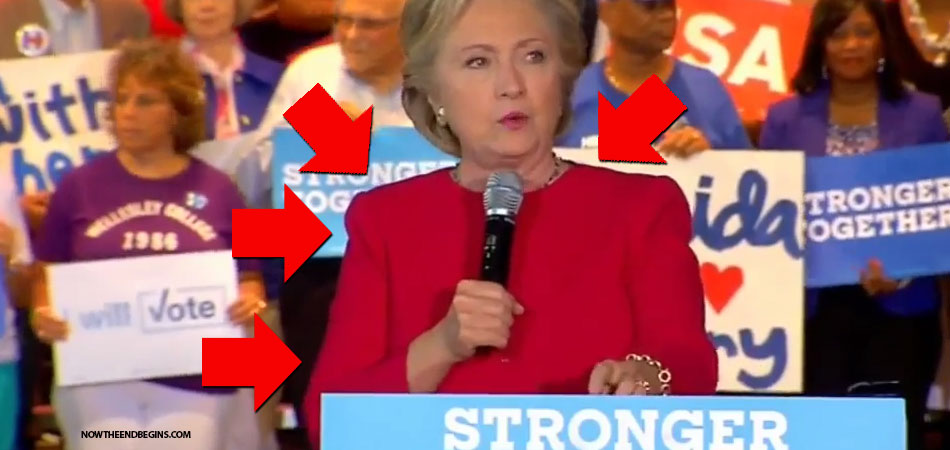Headline News
Russian Cash Flowed To Clinton Foundation After Hillary Approved Uranium Mine Sale
Hillary Clinton’s State Department was part of a panel that approved the sale of one of America’s largest uranium mines at the same time a foundation controlled by the seller’s chairman was making donations to a Clinton family charity, records reviewed by The Wall Street Journal show.

In a shocking story, broken by none other than the NY Times, it is being reported that the Clinton Foundation received steady cash payments as Russians pressed for and got control of a uranium mining company.
“Woe to them that devise iniquity, and work evil upon their beds! when the morning is light, they practise it, because it is in the power of their hand. And they covet fields, and take them by violence; and houses, and take them away: so they oppress a man and his house, even a man and his heritage. Therefore thus saith the Lord; Behold, against this family do I devise an evil, from which ye shall not remove your necks; neither shall ye go haughtily: for this time is evil.”
Micah 2:1-3 (KJV)
I recently wrote a piece on the long list of dead bodies linked to the Clintons, during their many years on the political stage in the U.S. It seems that now we can add a scandal exposing the Clintons as traitors and thieves.
Sleeping with the enemy does not go over well — not even with those who would have Hillary Clinton as the next president. The Clintons are professional criminals. They have made it through their scandals unscathed. Perhaps this is the SCANDAL of scandals, which will finally bring down the Clinton empire. If justice is served, Bill and Hillary Clinton will spend the rest of their lives in a prison.
The headline in Pravda trumpeted President Vladimir V. Putin’s latest coup, its nationalistic fervor recalling an era when the newspaper served as the official mouthpiece of the Kremlin: “Russian Nuclear Energy Conquers the World.”
The article, in January 2013, detailed how the Russian atomic energy agency, Rosatom, had taken over a Canadian company with uranium-mining stakes stretching from Central Asia to the American West. The deal made Rosatom one of the world’s largest uranium producers and brought Mr. Putin closer to his goal of controlling much of the global uranium supply chain.
But the untold story behind that story is one that involves not just the Russian president, but also a former American president and a woman who would like to be the next one.

Hillary Clinton’s State Department was part of a panel that approved the sale of one of America’s largest uranium mines at the same time a foundation controlled by the seller’s chairman was making donations to a Clinton family charity, records reviewed by The Wall Street Journal show.
At the heart of the tale are several men, leaders of the Canadian mining industry, who have been major donors to the charitable endeavors of former President Bill Clinton and his family. Members of that group built, financed and eventually sold off to the Russians a company that would become known as Uranium One.
Beyond mines in Kazakhstan that are among the most lucrative in the world, the sale gave the Russians control of one-fifth of all uranium production capacity in the United States. Since uranium is considered a strategic asset, with implications for national security, the deal had to be approved by a committee composed of representatives from a number of United States government agencies. Among the agencies that eventually signed off was the State Department, then headed by Mr. Clinton’s wife, Hillary Rodham Clinton.
As the Russians gradually assumed control of Uranium One in three separate transactions from 2009 to 2013, Canadian records show, a flow of cash made its way to the Clinton Foundation. Uranium One’s chairman used his family foundation to make four donations totaling $2.35 million. Those contributions were not publicly disclosed by the Clintons, despite an agreement Mrs. Clinton had struck with the Obama White House to publicly identify all donors. Other people with ties to the company made donations as well.
And shortly after the Russians announced their intention to acquire a majority stake in Uranium One, Mr. Clinton received $500,000 for a Moscow speech from a Russian investment bank with links to the Kremlin that was promoting Uranium One stock.
At the time, both Rosatom and the United States government made promises intended to ease concerns about ceding control of the company’s assets to the Russians. Those promises have been repeatedly broken, records show.
The New York Times’s examination of the Uranium One deal is based on dozens of interviews, as well as a review of public records and securities filings in Canada, Russia and the United States. Some of the connections between Uranium One and the Clinton Foundation were unearthed by Peter Schweizer, a former fellow at the right-leaning Hoover Institution and author of the forthcoming book “Clinton Cash.” Mr. Schweizer provided a preview of material in the book to The Times, which scrutinized his information and built upon it with its own reporting.
Whether the donations played any role in the approval of the uranium deal is unknown. But the episode underscores the special ethical challenges presented by the Clinton Foundation, headed by a former president who relied heavily on foreign cash to accumulate $250 million in assets even as his wife helped steer American foreign policy as secretary of state, presiding over decisions with the potential to benefit the foundation’s donors.
In a statement, Brian Fallon, a spokesman for Mrs. Clinton’s presidential campaign, said no one “has ever produced a shred of evidence supporting the theory that Hillary Clinton ever took action as secretary of state to support the interests of donors to the Clinton Foundation.” He emphasized that multiple United States agencies, as well as the Canadian government, had signed off on the deal and that, in general, such matters were handled at a level below the secretary. “To suggest the State Department, under then-Secretary Clinton, exerted undue influence in the U.S. government’s review of the sale of Uranium One is utterly baseless,” he added.
American political campaigns are barred from accepting foreign donations. But foreigners may give to foundations in the United States. In the days since Mrs. Clinton announced her candidacy for president, the Clinton Foundation has announced changes meant to quell longstanding concerns about potential conflicts of interest in such donations; it has limited donations from foreign governments, with many, like Russia’s, barred from giving to all but its health care initiatives. That policy stops short of Mrs. Clinton’s agreement with the Obama administration, which prohibited all foreign government donations while she served as the nation’s top diplomat.
Either way, the Uranium One deal highlights the limits of such prohibitions. The foundation will continue to accept contributions from foreign individuals and businesses whose interests, like Uranium One’s, may overlap with those of foreign governments, some of which may be at odds with the United States.
When the Uranium One deal was approved, the geopolitical backdrop was far different from today’s. The Obama administration was seeking to “reset” strained relations with Russia. The deal was strategically important to Mr. Putin, who shortly after the Americans gave their blessing sat down for a staged interview with Rosatom’s chief executive, Sergei Kiriyenko. “Few could have imagined in the past that we would own 20 percent of U.S. reserves,” Mr. Kiriyenko told Mr. Putin.
Now, after Russia’s annexation of Crimea and aggression in Ukraine, the Moscow-Washington relationship is devolving toward Cold War levels, a point several experts made in evaluating a deal so beneficial to Mr. Putin, a man known to use energy resources to project power around the world.
“Should we be concerned? Absolutely,” said Michael McFaul, who served under Mrs. Clinton as the American ambassador to Russia but said he had been unaware of the Uranium One deal until asked about it. “Do we want Putin to have a monopoly on this? Of course we don’t. We don’t want to be dependent on Putin for anything in this climate.”
Donations to the Clinton Foundation, and a Russian Uranium Takeover
The path to a Russian acquisition of American uranium deposits began in 2005 in Kazakhstan, where the Canadian mining financier Frank Giustra orchestrated his first big uranium deal, with Mr. Clinton at his side. Uranium investors’ efforts to buy mining assets in Kazakhstan and the United States led to a takeover bid by a Russian state-owned energy company. The investors gave millions to the Clinton Foundation over the same period, while Secretary of State Hillary Rodham Clinton’s office was involved with approving the Russian bid.
The two men had flown aboard Mr. Giustra’s private jet to Almaty, Kazakhstan, where they dined with the authoritarian president, Nursultan A. Nazarbayev. Mr. Clinton handed the Kazakh president a propaganda coup when he expressed support for Mr. Nazarbayev’s bid to head an international elections monitoring group, undercutting American foreign policy and criticism of Kazakhstan’s poor human rights record by, among others, his wife, then a senator.
Within days of the visit, Mr. Giustra’s fledgling company, UrAsia Energy Ltd., signed a preliminary deal giving it stakes in three uranium mines controlled by the state-run uranium agency Kazatomprom.
If the Kazakh deal was a major victory, UrAsia did not wait long before resuming the hunt. In 2007, it merged with Uranium One, a South African company with assets in Africa and Australia, in what was described as a $3.5 billion transaction. The new company, which kept the Uranium One name, was controlled by UrAsia investors including Ian Telfer, a Canadian who became chairman. Through a spokeswoman, Mr. Giustra, whose personal stake in the deal was estimated at about $45 million, said he sold his stake in 2007.
Soon, Uranium One began to snap up mining companies with assets in the United States. In April 2007, it announced the purchase of a uranium mill in Utah and more than 38,000 acres of uranium exploration properties in four Western states, followed quickly by the acquisition of the Energy Metals Corporation and its uranium holdings in Wyoming, Texas and Utah. That deal made clear that Uranium One was intent on becoming “a powerhouse in the United States uranium sector with the potential to become the domestic supplier of choice for U.S. utilities,” the company declared.
Still, the company’s story was hardly front-page news in the United States — until early 2008, in the midst of Mrs. Clinton’s failed presidential campaign, when The Times published an article revealing the 2005 trip’s link to Mr. Giustra’s Kazakhstan mining deal. It also reported that several months later, Mr. Giustra had donated $31.3 million to Mr. Clinton’s foundation.
Though the article quoted the former head of Kazatomprom, Moukhtar Dzhakishev, as saying that the deal required government approval and was discussed at a dinner with the president, Mr. Giustra insisted that it was a private transaction, with no need for Mr. Clinton’s influence with Kazakh officials. He described his relationship with the former American president as motivated solely by a shared interest in philanthropy.
As if to underscore the point, five months later Mr. Giustra held a fund-raiser for the Clinton Giustra Sustainable Growth Initiative, a project aimed at fostering progressive environmental and labor practices in the natural resources industry, to which he had pledged $100 million. The star-studded gala, at a conference center in Toronto, featured performances by Elton John and Shakira and celebrities like Tom Cruise, John Travolta and Robin Williams encouraging contributions from the many so-called F.O.F.s — Friends of Frank — in attendance, among them Mr. Telfer. In all, the evening generated $16 million in pledges, according to an article in The Globe and Mail.
“None of this would have been possible if Frank Giustra didn’t have a remarkable combination of caring and modesty, of vision and energy and iron determination,” Mr. Clinton told those gathered, adding: “I love this guy, and you should, too.”
But what had been a string of successes was about to hit a speed bump.
Arrest and Progress
By June 2009, a little over a year after the star-studded evening in Toronto, Uranium One’s stock was in free-fall, down 40 percent. Mr. Dzhakishev, the head of Kazatomprom, had just been arrested on charges that he illegally sold uranium deposits to foreign companies, including at least some of those won by Mr. Giustra’s UrAsia and now owned by Uranium One.
Publicly, the company tried to reassure shareholders. Its chief executive, Jean Nortier, issued a confident statement calling the situation a “complete misunderstanding.” He also publicly contradicted Mr. Giustra’s contention that the uranium mining deal had not required government blessing. “When you do a transaction in Kazakhstan, you need the government’s approval,” he said, adding that UrAsia had indeed received that approval.
But privately, Uranium One officials were worried they could lose their joint mining ventures. American diplomatic cables made public by WikiLeaks also reflect concerns that Mr. Dzhakishev’s arrest was part of a Russian power play for control of Kazakh uranium assets.
At the time, Russia was already eying a stake in Uranium One, Rosatom company documents show. Rosatom officials say they were seeking to acquire mines around the world because Russia lacks sufficient domestic reserves to meet its own industry needs.
It was against this backdrop that the Vancouver-based Uranium One pressed the American Embassy in Kazakhstan, as well as Canadian diplomats, to take up its cause with Kazakh officials, according to the American cables.
“We want more than a statement to the press,” Paul Clarke, a Uranium One executive vice president, told the embassy’s energy officer on June 10, the officer reported in a cable. “That is simply chitchat.” What the company needed, Mr. Clarke said, was official written confirmation that the licenses were still valid.
The American Embassy ultimately reported to the secretary of state, Mrs. Clinton. Though the Clarke cable was copied to her, it was given wide circulation, and it is unclear if she would have read it; the Clinton campaign did not address questions about the cable.
What is clear is that the embassy acted, with the cables showing that the unnamed energy officer met with Kazakh officials to discuss the issue on June 10 and 11.
Three days later, a wholly owned subsidiary of Rosatom completed a deal for 17 percent of Uranium One. And within a year, the Russian government would substantially up the ante, with a generous offer to shareholders that would give it a 51 percent controlling stake. But first, Uranium One had to get the American government to sign off on the deal.
The Power to Say No
When a company controlled by the Chinese government sought a 51 percent stake in a tiny Nevada gold mining operation in 2009, it set off a secretive review process in Washington, where officials raised concerns primarily about the mine’s proximity to a military installation, but also about the potential for minerals at the site, including uranium, to come under Chinese control. The officials killed the deal.
Such is the power of the Committee on Foreign Investment in the United States. The committee comprises some of the most powerful members of the cabinet, including the attorney general, the secretaries of the Treasury, Defense, Homeland Security, Commerce and Energy, and the secretary of state. They are charged with reviewing any deal that could result in foreign control of an American business or asset deemed important to national security.
The national security issue at stake in the Uranium One deal was not primarily about nuclear weapons proliferation; the United States and Russia had for years cooperated on that front, with Russia sending enriched fuel from decommissioned warheads to be used in American nuclear power plants in return for raw uranium. Instead, it concerned American dependence on foreign uranium sources. While the United States gets one-fifth of its electrical power from nuclear plants, it produces only around 20 percent of the uranium it needs, and most plants have only 18 to 36 months of reserves, according to Marin Katusa, author of “The Colder War: How the Global Energy Trade Slipped From America’s Grasp.”
“The Russians are easily winning the uranium war, and nobody’s talking about it,” said Mr. Katusa, who explores the implications of the Uranium One deal in his book. “It’s not just a domestic issue but a foreign policy issue, too.”
When ARMZ, an arm of Rosatom, took its first 17 percent stake in Uranium One in 2009, the two parties signed an agreement, found in securities filings, to seek the foreign investment committee’s review. But it was the 2010 deal, giving the Russians a controlling 51 percent stake, that set off alarm bells. Four members of the House of Representatives signed a letter expressing concern. Two more began pushing legislation to kill the deal.
Senator John Barrasso, a Republican from Wyoming, where Uranium One’s largest American operation was, wrote to President Obama, saying the deal “would give the Russian government control over a sizable portion of America’s uranium production capacity.”
“Equally alarming,” Mr. Barrasso added, “this sale gives ARMZ a significant stake in uranium mines in Kazakhstan.”
Uranium One’s shareholders were also alarmed, and were “afraid of Rosatom as a Russian state giant,” Sergei Novikov, a company spokesman, recalled in an interview. He said Rosatom’s chief, Mr. Kiriyenko, sought to reassure Uranium One investors, promising that Rosatom would not break up the company and would keep the same management, including Mr. Telfer, the chairman. Another Rosatom official said publicly that it did not intend to increase its investment beyond 51 percent, and that it envisioned keeping Uranium One a public company
Among the Donors to the Clinton Foundation
- Frank Giustra: $31.3 million and a pledge for $100 million more He built a company that later merged with Uranium One.
- Ian Telfer: $2.35 million. Mining investor who was chairman of Uranium One when an arm of the Russian government, Rosatom, acquired it.
- Paul Reynolds: $1 million to $5 million. Adviser on 2007 UrAsia-Uranium One merger. Later helped raise $260 million for the company.
- Frank Holmes: $250,000 to $500,000. Chief Executive of U.S. Global Investors Inc., which held $4.7 million in Uranium One shares in the first quarter of 2011.
- Neil Woodyer: $50,000 to $100,000. Adviser to Uranium One. Founded Endeavour Mining with Mr. Giustra.
- GMP Securities Ltd.: Donating portion of profits. Worked on debt issue that raised $260 million for Uranium One.
American nuclear officials, too, seemed eager to assuage fears. The Nuclear Regulatory Commission wrote to Senator Barrasso assuring him that American uranium would be preserved for domestic use, regardless of who owned it.
“In order to export uranium from the United States, Uranium One Inc. or ARMZ would need to apply for and obtain a specific NRC license authorizing the export of uranium for use reactor fuel,” the letter said.
Still, the ultimate authority to approve or reject the Russian acquisition rested with the cabinet officials on the foreign investment committee, including Mrs. Clinton — whose husband was collecting millions of dollars in donations from people associated with Uranium One.
Undisclosed Donations
Before Mrs. Clinton could assume her post as secretary of state, the White House demanded that she sign a memorandum of understanding placing limits on her husband’s foundation’s activities. To avoid the perception of conflicts of interest, beyond the ban on foreign government donations, the foundation was required to publicly disclose all contributors.
To judge from those disclosures — which list the contributions in ranges rather than precise amounts — the only Uranium One official to give to the Clinton Foundation was Mr. Telfer, the chairman, and the amount was relatively small: no more than $250,000, and that was in 2007, before talk of a Rosatom deal began percolating.
But a review of tax records in Canada, where Mr. Telfer has a family charity called the Fernwood Foundation, shows that he donated millions of dollars more, during and after the critical time when the foreign investment committee was reviewing his deal with the Russians. With the Russians offering a special dividend, shareholders like Mr. Telfer stood to profit.
His donations through the Fernwood Foundation included $1 million reported in 2009, the year his company appealed to the American Embassy to help it keep its mines in Kazakhstan; $250,000 in 2010, the year the Russians sought majority control; as well as $600,000 in 2011; and $500,000 in 2012. Mr. Telfer said that his donations had nothing to do with his business dealings, and that he had never discussed Uranium One with Mr. or Mrs. Clinton. He said he had given the money because he wanted to support Mr. Giustra’s charitable endeavors with Mr. Clinton. “Frank and I have been friends and business partners for almost 20 years,” he said.
The Clinton campaign left it to the foundation to reply to questions about the Fernwood donations; the foundation did not provide a response.
Mr. Telfer’s undisclosed donations came in addition to between $1.3 million and $5.6 million in contributions, which were reported, from a constellation of people with ties to Uranium One or UrAsia, the company that originally acquired Uranium One’s most valuable asset: the Kazakhstan mines. Without those assets, the Russians would have had no interest in the deal: “It wasn’t the goal to buy the Wyoming mines. The goal was to acquire the Kazakh assets, which are very good,” Mr. Novikov, the Rosatom spokesman, said in an interview.
Amid this influx of Uranium One-connected money, Mr. Clinton was invited to speak in Moscow in June 2010, the same month Rosatom struck its deal for a majority stake in Uranium One.
The $500,000 fee — among Mr. Clinton’s highest — was paid by Renaissance Capital, a Russian investment bank with ties to the Kremlin that has invited world leaders, including Tony Blair, the former British prime minister, to speak at its annual investor conference.
Renaissance Capital analysts talked up Uranium One’s stock, assigning it a “buy” rating and saying in a July 2010 research report that it was “the best play” in the uranium markets. In addition, Renaissance Capital turned up that same year as a major donor, along with Mr. Telfer and Mr. Giustra, to a small medical charity in Colorado run by a friend of Mr. Giustra’s. In a newsletter to supporters, the friend credited Mr. Giustra with helping get donations from “businesses around the world.”
A Renaissance Capital representative would not comment on the genesis of Mr. Clinton’s speech to an audience that included leading Russian officials, or on whether it was connected to the Rosatom deal. According to a Russian government news service, Mr. Putin personally thanked Mr. Clinton for speaking.
A person with knowledge of the Clinton Foundation’s fund-raising operation, who requested anonymity to speak candidly about it, said that for many people, the hope is that money will in fact buy influence: “Why do you think they are doing it — because they love them?” But whether it actually does is another question. And in this case, there were broader geopolitical pressures that likely came into play as the United States considered whether to approve the Rosatom-Uranium One deal.
Diplomatic Considerations
If doing business with Rosatom was good for those involved with the Uranium One deal, engaging with Russia was also a priority of the incoming Obama administration, which was hoping for a new era of cooperation as Mr. Putin relinquished the presidency — if only for a term — to Dmitri A. Medvedev.
“The assumption was we could engage Russia to further core U.S. national security interests,” said Mr. McFaul, the former ambassador.
It started out well. The two countries made progress on nuclear proliferation issues, and expanded use of Russian territory to resupply American forces in Afghanistan. Keeping Iran from obtaining a nuclear weapon was among the United States’ top priorities, and in June 2010 Russia signed off on a United Nations resolution imposing tough new sanctions on that country.
Two months later, the deal giving ARMZ a controlling stake in Uranium One was submitted to the Committee on Foreign Investment in the United States for review. Because of the secrecy surrounding the process, it is hard to know whether the participants weighed the desire to improve bilateral relations against the potential risks of allowing the Russian government control over the biggest uranium producer in the United States. The deal was ultimately approved in October, following what two people involved in securing the approval said had been a relatively smooth process.
Not all of the committee’s decisions are personally debated by the agency heads themselves; in less controversial cases, deputy or assistant secretaries may sign off. But experts and former committee members say Russia’s interest in Uranium One and its American uranium reserves seemed to warrant attention at the highest levels.
“This deal had generated press, it had captured the attention of Congress and it was strategically important,” said Richard Russell, who served on the committee during the George W. Bush administration. “When I was there invariably any one of those conditions would cause this to get pushed way up the chain, and here you had all three.”
And Mrs. Clinton brought a reputation for hawkishness to the process; as a senator, she was a vocal critic of the committee’s approval of a deal that would have transferred the management of major American seaports to a company based in the United Arab Emirates, and as a presidential candidate she had advocated legislation to strengthen the process.
The Clinton campaign spokesman, Mr. Fallon, said that in general, these matters did not rise to the secretary’s level. He would not comment on whether Mrs. Clinton had been briefed on the matter, but he gave The Times a statement from the former assistant secretary assigned to the foreign investment committee at the time, Jose Fernandez. While not addressing the specifics of the Uranium One deal, Mr. Fernandez said, “Mrs. Clinton never intervened with me on any C.F.I.U.S. matter.”
Mr. Fallon also noted that if any agency had raised national security concerns about the Uranium One deal, it could have taken them directly to the president.
Anne-Marie Slaughter, the State Department’s director of policy planning at the time, said she was unaware of the transaction — or the extent to which it made Russia a dominant uranium supplier. But speaking generally, she urged caution in evaluating its wisdom in hindsight.
“Russia was not a country we took lightly at the time or thought was cuddly,” she said. “But it wasn’t the adversary it is today.”
That renewed adversarial relationship has raised concerns about European dependency on Russian energy resources, including nuclear fuel. The unease reaches beyond diplomatic circles. In Wyoming, where Uranium One equipment is scattered across his 35,000-acre ranch, John Christensen is frustrated that repeated changes in corporate ownership over the years led to French, South African, Canadian and, finally, Russian control over mining rights on his property.
“I hate to see a foreign government own mining rights here in the United States,” he said. “I don’t think that should happen.”
Mr. Christensen, 65, noted that despite assurances by the Nuclear Regulatory Commission that uranium could not leave the country without Uranium One or ARMZ obtaining an export license — which they do not have — yellowcake from his property was routinely packed into drums and trucked off to a processing plant in Canada.
Asked about that, the commission confirmed that Uranium One has, in fact, shipped yellowcake to Canada even though it does not have an export license. Instead, the transport company doing the shipping, RSB Logistic Services, has the license. A commission spokesman said that “to the best of our knowledge” most of the uranium sent to Canada for processing was returned for use in the United States. A Uranium One spokeswoman, Donna Wichers, said 25 percent had gone to Western Europe and Japan. At the moment, with the uranium market in a downturn, nothing is being shipped from the Wyoming mines.
The “no export” assurance given at the time of the Rosatom deal is not the only one that turned out to be less than it seemed. Despite pledges to the contrary, Uranium One was eventually delisted from the Toronto Stock Exchange and taken private. As of 2013, Rosatom’s subsidiary, ARMZ, owned 100 percent of the company.” [1] – source

Free Bible Program
We Just Sent One Bible For Every Detainee At The 1,400 Bed Karnes County Facility As Chaplain Segunda Tells Us 53 People Just Got Saved

This month we have sent out nearly 5,000 pounds of Bibles, New Testaments and scripture portions to jails, prisons and detention centers across America
Chaplain Segunda wrote to tell us two things the other day. The first was that she was very grateful to have received the 1,400 Bibles we sent to the Karnes County Detention Center last week, the second thing she wrote to tell us was that 53 people had prayed to get saved, and they were overjoyed to receive those Bibles from us. An equal amount of Bibles went out to the South Texas Immigration Detention Center, and 750 King James Bibles were sent to the Floyd County Jail in Georgia.
“But the word of God grew and multiplied.” Acts 12:24 (KJB)
I got a letter yesterday Mark & Margie Beamer who attend the Wooster Bible Church in Ohio, they were writing to send a donation for Bibles Behind Bars and to tell us that the Bibles we sent to that church last year for their jail ministry at the Richland County Jail are still being given out, and that they were excited to help give them out. What a blessing that is for the giver and the receiver!
- HOW TO DONATE: Click here to view our WayGiver Funding page
Christian, your prayers and donations are fueling an amazing boots-on-the-ground offensive to put the word of God into as many jails and prisons as the Lord will allow. New requests come in on a daily basis, please keep us in your prayers. And if God has prospered you, please take a moment to click on the donate button to send is a generous financial contribution to keep the supply line of King James Bibles, News Testaments, scripture portions and gospel tracts wide open. Thank you so much…TO THE FIGHT!!!
Now The End Begins is your front line defense against the rising tide of darkness in the last Days before the Rapture of the Church
- HOW TO DONATE: Click here to view our WayGiver Funding page
When you contribute to this fundraising effort, you are helping us to do what the Lord called us to do. The money you send in goes primarily to the overall daily operations of this site. When people ask for Bibles, we send them out at no charge. When people write in and say how much they would like gospel tracts but cannot afford them, we send them a box at no cost to them for either the tracts or the shipping, no matter where they are in the world. We have a Gospel Billboard program. We are now broadcasting Bible studies, Podcasts and a Sunday Service 5 times a week, thanks to your generous donations. All this is possible because YOU pray for us, YOU support us, and YOU give so we can continue growing.
But whatever you do, don’t do nothing. Time is short and we need your help right now. The Lord has given us an open door with a tremendous ‘course’ for us to fulfill that will create an excellent experience at the Judgement Seat of Christ. Please pray for our efforts, and if the Lord leads you to donate, be as generous as possible. The war is REAL, the battle HOT and the time is SHORT…TO THE FIGHT!!!
“Looking for that blessed hope, and the glorious appearing of the great God and our Saviour Jesus Christ;” Titus 2:13 (KJB)
“Thank you very much!” – Geoffrey, editor-in-chief, NTEB
Artificial Intelligence
Please Give A Hearty End Times Welcome To ‘Thermonator’, The World’s First Flamethrower-Wielding Robot Attack Dog Straight Out Of Revelation

While it may sound like an episode of Black Mirror, Americans can now purchase a flamethrower-wielding robot dog online from Throwflame called Thermonator.
Have you ever spent a hot, summer afternoon at a water park? I have, and it’s one of my favorite things to do. There is this curious moment that takes place after you enter into the water, right before the thundering force of the jets carry you forward. In that brief, little space, you are calm and peaceful, luxuriously basking in the cool water. Then you reach the main current and woosh!! you go at what feels like a million miles per hour. This is where we are right now with the incoming tide of AI and robot technology, in that brief little moment before the avalanche sweeps us inexorably forward into only God knows what’s coming next.
“Behold ye among the heathen, and regard, and wonder marvellously: for I will work a work in your days, which ye will not believe, though it be told you.” Habakkuk 1:5 (KJB)
The opening years of the 20th century was an overwhelming outpouring of information and global travel and exploration, exactly as Daniel had foreseen in chapter 12 of his book. In America, so many new things were being invented that we felt that nothing was out of our reach, and that we were on the verge of create a thousand year reign of peace and prosperity. Many of the Christian scholars were amillennial, secure in their thinking that we were ‘bringing in the kingdom’. Then WWI hit, and the world watch as all that technology we had just invented was now being used to wage war as never seen before in entire annals of human history. Soldiers literally went insane watching the ‘benefits of modern technology’ helping them to live a ‘better and more prosperous life’. Now here in 2024 we have flamethrower-wielding robot dogs named Thermonator here to meet all our flamethrowing needs as Hell continues to enlarge itself. Check your watch, Christian, it’s later than you think.
Meet the Thermonator: First ever flamethrowing robot dog that shoots jets of fire up to 30 feet hits US market
FROM THE DAILY MAIL UK: Ohio-based Throwflame opened sales for its ‘Thermonator’ Tuesday, selling its 37-pound quadruped machine for $9,420 that is legal in all US states except Maryland. A demonstration video shows a Thermonator creeping and jumping through a forest before torching its surroundings with a 30-foot jet of fire spewing from a flame thrower on its back. Throwflame, based in Cleveland, claims to be the oldest flamethrower manufacturer in the US.
The company released the first-ever full-sized, commercially available flamethrower in 2015, which shoots flames up to 50 feet. ‘This unregulated flamethrower sparked a significant media response relating to legality,’ Throwflame shared on its website. ‘However, flamethrowers remain federally unregulated. This means anyone can buy one without background checks or a waiting period.’
Thermonator appears to be designed like most quadruped robots but has one of Throwflame’s devices attached to its back. The robot dog boasts a variety of cameras and sensors, allowing it to autonomously move throughout its surroundings and find targets to set ablaze. The machine is remotely operated – the demonstration video shows a handler controlling it with a smartphone.
Social media users have weighed in on the machine, comparing it to an episode in the fourth season of Black Mirror titled ‘Metalhead.’
The episode explores what could happen if these machines turned on us, revealing the terrifying quest for survival in a world where robo-dogs can outrun and outsmart humans. X user Rob Sheepe posted: ‘Some real-life Black Mirror ‘Metalhead’ terror right here. How is this legal?’
However, Maryland is the only US state that bans flamethrowers – California requires a permit to own one. Possessing or using a flamethrower in Maryland is punishable by a $250,000 fine and up to 25 years imprisonment. In 2015, Congress introduced a bill that would treat flamethrowers like machine guns, but was stalled and later dismissed. READ MORE
The Robot Dog With A Flamethrower | Thermonator
Now The End Begins is your front line defense against the rising tide of darkness in the last Days before the Rapture of the Church
- HOW TO DONATE: Click here to view our WayGiver Funding page
When you contribute to this fundraising effort, you are helping us to do what the Lord called us to do. The money you send in goes primarily to the overall daily operations of this site. When people ask for Bibles, we send them out at no charge. When people write in and say how much they would like gospel tracts but cannot afford them, we send them a box at no cost to them for either the tracts or the shipping, no matter where they are in the world. We have a Gospel Billboard program. We are now broadcasting Bible studies, Podcasts and a Sunday Service 5 times a week, thanks to your generous donations. All this is possible because YOU pray for us, YOU support us, and YOU give so we can continue growing.
But whatever you do, don’t do nothing. Time is short and we need your help right now. The Lord has given us an open door with a tremendous ‘course’ for us to fulfill that will create an excellent experience at the Judgement Seat of Christ. Please pray for our efforts, and if the Lord leads you to donate, be as generous as possible. The war is REAL, the battle HOT and the time is SHORT…TO THE FIGHT!!!
“Looking for that blessed hope, and the glorious appearing of the great God and our Saviour Jesus Christ;” Titus 2:13 (KJB)
“Thank you very much!” – Geoffrey, editor-in-chief, NTEB
Headline News
Joe Biden Is Right Now Considering Declaring A ‘National Climate Emergency’ That Would Give Him Hitlerian Powers Over The American People

The Biden White House is considering declaring a ‘national climate emergency’ to block American energy development while appeasing its extremist environmentalist donor base.
Oh, how I wish this was coming to you today from The Babylon Bee, but sadly it is actual news that is actually happening in Washington right now. Pretend president Joe Biden is being told by third term president Barack Obama that he needs to declare a ‘national climate emergency’, and Biden is actively and seriously considering doing it. Should he declare a national climate emergency, Biden would be granted powers similar to the pandemic where the government suspended the Constitution for ‘the greater good’. Sounds more like the Greater Reich to me.
“But the day of the Lord will come as a thief in the night; in the which the heavens shall pass away with a great noise, and the elements shall melt with fervent heat, the earth also and the works that are therein shall be burned up.” 2 Peter 3:10 (KJB)
With each passing day, if you are following events as they unfold, an orchestrated Joe Biden victory in November grows more and more likely, as prison time for Donald Trump gets closer and closer. I don’t know for sure that that will happen, but that’s currently how things are trending. As outrageous as it may seem for me to site here and tell you that the Democrats just might be planning a coup on the back of a ‘national climate emergency’, I ask you to remember the events that began 1,500 days ago today. We call it the pandemic, and it looks like they are getting ready to lock us down again for ‘the greater good’ of the Earth. We have been telling you for a few years now that the New World Order comes in on the back of Climate Change laws, mandates and regulations. If it happens, when it happens, you may consider that to be Day 1 of the new Civil War.
Biden Considers Ridiculous ‘Climate Emergency’ Declaration
FROM NATIONAL REVIEW: Top advisers to President Joe Biden resumed talks on declaring such an emergency. The goal would be to suspend offshore drilling and oil exports to reduce carbon dioxide emissions, according to Bloomberg.
Top advisers to President Joe Biden resumed talks on declaring such an emergency. The goal would be to suspend offshore drilling and oil exports to reduce carbon dioxide emissions, according to Bloomberg.
Bloomberg states explicitly that the administration knows such a declaration wouldn’t actually help the environment. The real purpose of the announcement is that it “would galvanize climate-minded voters.” This wouldn’t even be the first time this month Biden sacrificed America’s energy interests in the name of his reelection prospects.
Are you ready for the next lockdown? You better be, pretend president Joe Biden is considering declaring a national climate emergency that will give him actual dictatorial powers like The Enabling Act. #NationalClimateEmergency #EarthDay2024 #NewWorldOrder #ObamasThirdTerm pic.twitter.com/4w5t4U37Jv
— Now The End Begins (@NowTheEndBegins) April 24, 2024
“President Biden has treated the climate crisis as an emergency since day one and will continue to build a clean energy future that lowers utility bills, creates good-paying union jobs, makes our economy the envy of the world and prioritizes communities that for too long have been left behind,” White House spokesperson Angelo Fernandez Hernandez told Bloomberg.
In Biden’s head, it’s also not the first time he’s declared a climate emergency.
In an interview last year with the Weather Channel, Biden falsely said that he’d “already done that” when asked whether he intends to declare a climate emergency. The inaccuracy was so blatant that his statement was fact-checked as false by CNN, which is not exactly known as a right-leaning news source. CNN later blamed Biden’s false statement on “the pressure he’s under” to avoid insinuating that the president could possibly be in a state of mental decline. READ MORE
Now The End Begins is your front line defense against the rising tide of darkness in the last Days before the Rapture of the Church
- HOW TO DONATE: Click here to view our WayGiver Funding page
When you contribute to this fundraising effort, you are helping us to do what the Lord called us to do. The money you send in goes primarily to the overall daily operations of this site. When people ask for Bibles, we send them out at no charge. When people write in and say how much they would like gospel tracts but cannot afford them, we send them a box at no cost to them for either the tracts or the shipping, no matter where they are in the world. We have a Gospel Billboard program. We are now broadcasting Bible studies, Podcasts and a Sunday Service 5 times a week, thanks to your generous donations. All this is possible because YOU pray for us, YOU support us, and YOU give so we can continue growing.
But whatever you do, don’t do nothing. Time is short and we need your help right now. The Lord has given us an open door with a tremendous ‘course’ for us to fulfill that will create an excellent experience at the Judgement Seat of Christ. Please pray for our efforts, and if the Lord leads you to donate, be as generous as possible. The war is REAL, the battle HOT and the time is SHORT…TO THE FIGHT!!!
“Looking for that blessed hope, and the glorious appearing of the great God and our Saviour Jesus Christ;” Titus 2:13 (KJB)
“Thank you very much!” – Geoffrey, editor-in-chief, NTEB
-

 George Soros7 years ago
George Soros7 years agoProof Of George Soros Nazi Past Finally Comes To Light With Discovery Of Forgotten Interview
-

 Election 20167 years ago
Election 20167 years agoDEAD POOL DIVA: Huma Abedin Kept Those Hillary Emails That The FBI Found In A Folder Marked ‘Life Insurance’
-

 Election 20168 years ago
Election 20168 years agoCrooked Hillary Campaign Used A Green Screen At Today’s Low Turnout Rally In Coconut Creek FL
-

 George Soros7 years ago
George Soros7 years agoSORE LOSER: George Soros Declares War On America As Violent MoveOn.Org Protests Fill The Streets
-

 Donald Trump7 years ago
Donald Trump7 years agoDonald Trump Will Be 70 Years, 7 Months And 7 Days Old On First Full Day In Office As President
-

 Headline News7 years ago
Headline News7 years agoIf Hillary Is Not Guilty, Then Why Are Her Supporters Asking Obama To Pardon Her? Hmm…
-

 Election 20168 years ago
Election 20168 years agoWikiLeaks Shows George Soros Controlling Vote With 16 States Using SmartMatic Voting Machines
-

 End Times7 years ago
End Times7 years agoFalse Teacher Beth Moore Endorses The Late Term Partial-Birth Abortion Candidate Crooked Hillary











































































